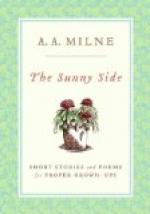Till then I had regarded Humphrey—save for his power of rolling the eyes and his habit of taking long jumps from the music-stool to the book-case—as rather a sedentary character. But in the fight which followed he put up an amazingly good resistance. At one time he was underneath Bingo; the next moment he had Bingo down; first one, then the other, seemed to gain the advantage. But blood will tell. Humphrey’s ancestry is unknown; I blush to say that it may possibly be German. Bingo had Goodwood Lo to support him—in two places. Gradually he got the upper hand; and at last, taking the reluctant Humphrey by the ear, he dragged him laboriously beneath the sofa. He emerged alone, with tail wagging, and was taken on to his mistress’s lap. There he slept, his grief forgotten.
So Humphrey was found a job. Whenever Bingo wants exercise, Humphrey plants himself in the middle of the room, his eyes cast upwards in an affectation of innocence. “I’m just sitting here,” says Humphrey; “I believe there’s a fly on the ceiling.” It is a challenge which no great-grandson of Goodwood Lo could resist. With a rush Bingo is at him. “I’ll learn you to stand in my way,” he splutters. And the great dust-up begins....
Brave little Bingo! I don’t wonder that so warlike a race as the Japanese has called a province after him.
A WARM HALF-HOUR
Whatever the papers say, it was the hottest afternoon of the year. At six-thirty I had just finished dressing after my third cold bath since lunch, when Celia tapped on the door.
“I want you to do something for me,” she said. “It’s a shame to ask you on a day like this.”
“It is rather a shame,” I agreed, “but I can always refuse.”
“Oh, but you mustn’t. We haven’t got any ice, and the Thompsons are coming to dinner. Do you think you could go and buy threepennyworth? Jane’s busy, and I’m busy, and—”
“And I’m busy,” I said, opening and shutting a drawer with great rapidity.
“Just threepennyworth,” she pleaded. “Nice cool ice. Think of sliding home on it.”
Well, of course it had to be done. I took my hat and staggered out. On an ordinary cool day it is about half a mile to the fishmonger; to-day it was about two miles and a quarter. I arrived exhausted, and with only just strength enough to kneel down and press my forehead against the large block of ice in the middle of the shop, round which the lobsters nestled.
“Here, you mustn’t do that,” said the fishmonger, waving me away.
I got up, slightly refreshed.
“I want,” I said, “some—” and then a thought occurred to me.
After all, did fishmongers sell ice? Probably the large block in front of me was just a trade sign like the coloured bottles at the chemist’s. Suppose I said to a fellow of the Pharmaceutical Society, “I want some of that green stuff in the window,” he would only laugh. The tactful thing to do would be to buy a pint or two of laudanum first, and then, having established pleasant relations, ask him as a friend to lend me his green bottle for a bit.




